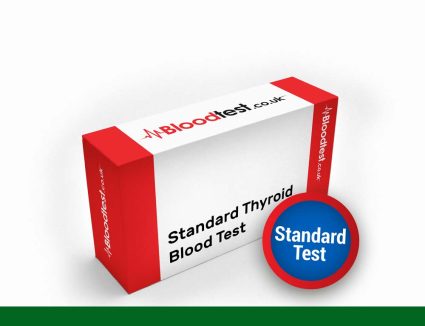Comprehensive Insights into Thyroid Blood Tests: Essential Information for Patients
Unpacking the Importance of Thyroid Blood Tests

A thyroid blood test in Stowmarket is a vital diagnostic assessment that evaluates the health and performance of the thyroid gland. This crucial examination measures the levels of key thyroid hormones, including TSH (Thyroid Stimulating Hormone), T3 (Triiodothyronine), and T4 (Thyroxine). By analysing these hormone levels, healthcare professionals can identify and diagnose a range of thyroid disorders, such as hypothyroidism, which indicates an underactive thyroid, or hyperthyroidism, where the thyroid is overactive. Recognising these thyroid conditions is imperative as they can significantly impact an individual's well-being, energy levels, and overall quality of life, making it essential for patients to understand the importance of undergoing this testing procedure.
The thyroid gland, shaped like a butterfly and located at the base of the neck, plays a crucial role in regulating metabolism, energy production, and a multitude of bodily functions. The thyroid blood test offers invaluable insights into the functional status of this gland through a simple blood draw, which is usually taken from your arm. By familiarising themselves with the intricacies of this test, residents of Stowmarket can take proactive steps to effectively manage their health and well-being.
Prefer Listening? Explore Our Informative Audio Clip!
 Identifying When It's Time to Get a Thyroid Blood Test
Identifying When It's Time to Get a Thyroid Blood Test
The need for a thyroid blood test in Stowmarket can arise from a variety of symptoms or risk factors that may indicate underlying issues. Many individuals seek testing due to persistent fatigue, significant weight fluctuations, or unexplained changes in mood. While these symptoms do not always point directly to thyroid dysfunction, their prevalence makes it prudent to conduct further investigations to rule out any potential thyroid-related problems.
Additionally, family history plays a pivotal role in assessing risk; individuals with relatives who have experienced thyroid disorders may find themselves at heightened risk. Conditions such as Hashimoto's thyroiditis and Graves' disease often exhibit hereditary tendencies, emphasising the importance of awareness and early detection in effective management. By taking a proactive approach to thyroid health, individuals can enhance their health outcomes and improve their quality of life.
Furthermore, pregnant women or those planning to conceive may need to undergo thyroid testing, as hormonal fluctuations during pregnancy can significantly affect thyroid function. Women are generally more susceptible to thyroid-related disorders, making vigilant monitoring of thyroid health crucial during these critical times for both maternal and fetal well-being.
Essential Preparation Steps for Your Thyroid Blood Test
Preparation for a thyroid blood test in Stowmarket may vary depending on the specific guidelines provided by your GP. In most cases, it is recommended to fast for several hours prior to the test to ensure the accuracy of the results, particularly if additional blood tests are being conducted simultaneously. It is also paramount to inform your healthcare provider about any medications you are currently taking, as certain drugs—including those for heart conditions and anxiety—can influence thyroid hormone levels.
Patients should feel encouraged to ask questions if they are uncertain about the necessary preparations. Consulting with your GP before the test can help alleviate any concerns and clarify what to expect on the test day. Being well-informed and adequately prepared can reduce anxiety, leading to a smoother testing experience and more reliable outcomes.
Examining Thyroid Blood Testing Services Available in Stowmarket

Utilising Stowmarket Health Centre for Your Thyroid Blood Testing Needs
The Stowmarket Health Centre stands out as a reputable facility for residents seeking a thyroid blood test in Stowmarket. This clinic provides a comprehensive range of health services, including routine blood tests that assess thyroid function. Patients can easily schedule appointments, allowing them to choose a time that fits seamlessly into their busy lives.
Opting for a local health centre delivers advantages beyond just convenience; it fosters familiarity with the facility and its staff. The healthcare providers at Stowmarket Health Centre are well-versed in various health concerns and can offer comprehensive guidance throughout the testing process. They are equipped to provide insights into managing symptoms while awaiting test results, ensuring a supportive and informative healthcare experience.
Moreover, local health centres typically collaborate with specialists in endocrinology, enabling seamless referrals should further evaluation be necessary. Engaging with community healthcare services cultivates trust and reliability, both of which are essential components of effective health management and patient care.
Private Clinics Offering Discreet Thyroid Blood Testing in Stowmarket
Numerous private clinics in Stowmarket provide thyroid blood testing options for those who prefer a more discreet approach to their healthcare. These clinics represent a convenient choice for individuals desiring quick and confidential testing services. Patients often discover they can receive test results more rapidly than through NHS services, which can be particularly appealing for those eager to gain insights into their health status without delay.
In addition to speed, private clinics may offer various supplementary services, including comprehensive health assessments and personalized treatment plans tailored to individual needs. This customised approach fosters a welcoming environment, especially for patients who may experience anxiety regarding medical procedures.
While private testing typically incurs associated costs, many clinics maintain transparency about their pricing, empowering patients to make informed decisions regarding their healthcare. It is vital to choose reputable clinics staffed by qualified medical professionals to ensure that all tests yield accurate and reliable results.
Accessing NHS Services for Thorough Thyroid Blood Testing in Stowmarket

The NHS in Stowmarket offers robust services for individuals needing a thyroid blood test. If your GP suspects a thyroid-related issue based on your symptoms, they can refer you for testing. This process typically commences with an initial consultation, where your medical history and present symptoms will be thoroughly evaluated.
Utilising NHS services guarantees access to an extensive range of tests and treatments without the financial burdens often associated with private healthcare options. However, it is crucial to keep in mind that waiting times may be longer than those experienced at private clinics, thus patience is often required.
Despite this, the NHS remains a cornerstone of healthcare in the UK, providing a wealth of resources readily available to patients. Engaging with NHS services means benefiting from comprehensive care, which includes follow-up appointments, specialist referrals, and established protocols for effectively managing thyroid conditions.
Understanding the Thyroid Blood Testing Process: A Step-by-Step Guide
The Comprehensive Procedure for Conducting a Thyroid Blood Test
The thyroid blood test in Stowmarket involves a straightforward procedure that begins with a healthcare professional drawing a small blood sample. This is generally performed from a vein in your arm using a fine needle. While this may cause some apprehension for individuals, the process is quick and is typically regarded as safe.
Once the blood sample is collected and sent to a laboratory for detailed analysis, results are usually expected within a few days. However, the timeframe can vary based on the laboratory's workload and the specific tests requested. Understanding this timeline can help alleviate concerns about the wait for results, making patients feel more at ease.
It is advisable for patients to remain calm throughout the procedure. Healthcare professionals are trained to provide support, ensuring the experience is as comfortable as possible. Those who have a fear of needles should feel free to discuss this concern with their provider, who may offer techniques to ease anxiety, such as distraction or controlled breathing exercises.
What to Anticipate During Your Thyroid Blood Test Experience
While the prospect of a medical procedure can be anxiety-inducing, knowing what to expect during a thyroid blood test in Stowmarket can significantly alleviate worries. Upon arriving at the testing facility, you will likely be welcomed by friendly staff members who will guide you through the process. After completing some preliminary paperwork, you will be escorted to a private area where the blood draw will take place.
The blood draw is quick, typically lasting only a few minutes. A healthcare professional will begin by cleaning the area on your arm with an antiseptic wipe and applying a tourniquet to enhance the visibility of the vein. Following the insertion of the needle, you might feel a brief pinch; however, discomfort is usually minimal and fleeting.
After collecting the sample, the professional will apply a small bandage to the puncture site. It is advisable to remain seated for a few moments to ensure you feel well before leaving, especially if you tend to feel light-headed following blood draws. This attentiveness to patient comfort reflects the quality of local healthcare services, underscoring the supportive framework readily available in Stowmarket.
What to Expect After Your Thyroid Blood Test
The anticipation of results can be overwhelming following your thyroid blood test in Stowmarket. Once the laboratory has analysed your blood sample, the results will be sent to your GP, who will schedule a follow-up appointment to discuss them. Depending on the findings, your GP may recommend further testing or initiate tailored treatment strategies to meet your specific needs.
During this follow-up appointment, it is crucial to ask questions and express any concerns you may have. A clear understanding of your results and their implications for your health is necessary for fostering a proactive approach to any diagnosed conditions. It is also important to discuss any symptoms you have been experiencing, as this information can help guide treatment decisions.
If results indicate abnormalities, your GP will explain their significance and potential next steps, which could involve additional testing or referrals to specialists. Regular monitoring of thyroid function is essential for individuals diagnosed with thyroid conditions, ensuring optimal management and timely adjustments to treatment plans as necessary.
Decoding Your Thyroid Blood Test Results: What They Mean
Understanding Normal Ranges for Thyroid Hormone Levels
Grasping what constitutes normal thyroid hormone levels is vital for accurately interpreting the results of a thyroid blood test in Stowmarket. Generally, normal TSH levels fall between 0.4 and 4.0 milliunits per litre, while T3 and T4 levels may fluctuate based on individual factors and the reference ranges established by the testing laboratory.
When these hormones remain within the specified normal ranges, it suggests that the thyroid is functioning optimally, effectively supporting vital bodily processes such as metabolism, heart rate, and mental well-being. When hormone levels fall within these parameters, it typically indicates positive thyroid health, implying that further interventions may not be necessary.
However, normal ranges can vary slightly depending on the specific laboratory conducting the test. This variability underscores the importance of discussing results with a qualified healthcare provider, who can offer context and clarity tailored to your unique health situation.
Interpreting Abnormal Thyroid Blood Test Results: What They Indicate
Receiving abnormal results from a thyroid blood test in Stowmarket can certainly be concerning, yet understanding what these results signify is essential for determining the next steps in managing your health. An elevated TSH level typically indicates hypothyroidism, a condition where the thyroid is underperforming, potentially leading to symptoms such as fatigue, weight gain, and depression.
Conversely, low TSH levels may suggest hyperthyroidism, a state in which the thyroid is overactive, potentially resulting in symptoms such as weight loss, anxiety, or rapid heartbeats. In both scenarios, further investigation is often warranted to identify the underlying cause, which may include additional blood tests or imaging studies.
Your GP will assist you in navigating this complex landscape, providing insights into the potential causes of the abnormalities and discussing available treatment options. Importantly, abnormal thyroid hormone levels do not necessarily equate to a lifelong condition; many cases can be effectively managed through lifestyle changes, medication, or other interventions, highlighting the significance of maintaining a proactive approach to your health.
Engaging in Constructive Conversations About Your Results with Your GP
Discussing your thyroid blood test results with your GP is crucial for developing a comprehensive understanding of your health status. During this consultation, your GP will clarify the implications of your test results, explaining what the numbers indicate regarding your thyroid function and overall well-being. This interaction presents an excellent opportunity for you to ask questions, express concerns, and seek clarity regarding the next steps in your healthcare journey.
Your GP may explore potential causes for any abnormalities, linking them to your medical history or lifestyle factors. This dialogue is vital for crafting a personalised treatment plan that aligns with your health objectives. Whether the plan involves medication, lifestyle adjustments, or further testing, having a clear grasp of your situation empowers you to take actionable steps towards improved health.
Moreover, this discussion transcends mere numbers; it encompasses your body and its functions. Patients are encouraged to share any symptoms they have been experiencing, as this information can play a pivotal role in determining the most appropriate course of action.
Factors That Can Influence Thyroid Test Results: What You Should Know
Several factors can affect the outcome of your thyroid blood test in Stowmarket, and being aware of these variables can enrich your understanding of your results. For example, certain medications, such as corticosteroids, lithium, or specific heart medications, can alter thyroid hormone levels, potentially leading to misleading results. Therefore, it is essential to inform your GP about your medications for accurate interpretation.
Pregnancy is another significant factor that can impact thyroid function. During pregnancy, a woman’s body experiences profound hormonal changes that can temporarily modify thyroid hormone levels. Consequently, pregnant women are often monitored more closely to maintain maternal and fetal health throughout the pregnancy.
Other health conditions, such as autoimmune diseases or chronic infections, can also influence thyroid function and test results. Physical or emotional stress might also play a role, as it may affect hormone production and regulation. Recognising these variables is crucial for developing a comprehensive understanding of your thyroid health and the factors that may influence it.
The Importance of Ongoing Monitoring of Thyroid Function for Optimal Health
Regular monitoring of thyroid function is essential for anyone diagnosed with a thyroid condition. A thyroid blood test in Stowmarket is not merely a one-time event; it is part of an ongoing process to ensure optimal health outcomes. Regular testing allows for timely adjustments to treatment plans based on the thyroid's performance over time.
For individuals diagnosed with conditions such as hypothyroidism or hyperthyroidism, tracking hormone levels is critical for assessing the effectiveness of medication or other interventions. This ongoing relationship with healthcare providers is vital for effectively managing symptoms and preventing complications.
Furthermore, lifestyle factors, including diet, exercise, and stress management, can significantly influence thyroid health. Regular follow-up appointments ensure that any changes in lifestyle or symptoms are taken into account, leading to informed and tailored healthcare decisions that benefit your overall health and well-being.
Identifying Common Thyroid Conditions Diagnosed Through Blood Tests
Delving Deep into Hypothyroidism: Understanding the Condition
Hypothyroidism is a medical condition characterised by an underactive thyroid, resulting in insufficient production of thyroid hormones. This condition is widespread among individuals in the UK and may manifest through various symptoms, including fatigue, weight gain, increased sensitivity to cold, and depression. A thyroid blood test in Stowmarket assists in diagnosing this condition by measuring elevated TSH levels alongside low T3 and T4 levels, providing crucial insights into thyroid function.
Managing hypothyroidism typically involves long-term treatment, primarily through medication such as levothyroxine, which supplements thyroid hormone levels. Regular monitoring of hormone levels is imperative, as it allows adjustments to be made in response to fluctuations in symptoms or hormonal levels.
Understanding the implications of hypothyroidism empowers patients to seek treatment and advocate for their health. Maintaining open lines of communication with healthcare providers and sharing any changes or concerns regarding symptoms is vital for ensuring effective management of this condition.
Delving Deep into Hyperthyroidism: Understanding the Condition
Conversely, hyperthyroidism results from the thyroid producing excessive levels of hormones, leading to symptoms such as unintended weight loss, rapid heartbeat, and anxiety. This condition necessitates prompt diagnosis and intervention, and a thyroid blood test in Stowmarket will typically reveal low TSH levels alongside elevated T3 and T4 levels, aiding in the identification of this disorder.
Treatment options for hyperthyroidism may include anti-thyroid medications, radioactive iodine therapy, or, in some cases, surgery, depending on the severity of the condition and patient preferences. Regular follow-up is critical to ensure that hormone levels stabilise and symptoms are effectively managed over time.
Hyperthyroidism can significantly impact daily life, making education and support vital components of effective management. Patients are encouraged to learn about their condition, engage in discussions with healthcare providers, and connect with support groups to share experiences and advice.
Addressing Thyroid Nodules and Cancer: The Role of Blood Tests
Blood tests can also reveal the presence of thyroid nodules or cancer, although further diagnostic procedures, such as ultrasounds or biopsies, are often necessary for confirmation. Thyroid nodules are common and typically benign; however, they can sometimes indicate more serious conditions, including thyroid cancer.
A thyroid blood test in Stowmarket can help determine whether nodules are functioning, non-functioning, or malignant, which is crucial for guiding appropriate management strategies. The anxiety surrounding the potential for cancer can be overwhelming, making it all the more important for patients to maintain open communication with their healthcare team throughout the diagnostic process.
Awareness and early detection are key to effectively managing thyroid nodules and cancer. Regular check-ups and monitoring can facilitate timely interventions, improving outcomes and quality of life for those affected by these conditions.
Exploring Comprehensive Treatment Options for Thyroid Conditions
Utilising Medication as a Primary Treatment for Thyroid Disorders
For many patients diagnosed with thyroid disorders, medication serves as the primary treatment avenue. For instance, individuals with hypothyroidism are typically prescribed levothyroxine, a synthetic form of the thyroid hormone T4, which helps to restore normal hormone levels. This approach alleviates symptoms and enhances overall quality of life, allowing patients to resume their daily activities with renewed energy and vitality.
Additionally, individuals diagnosed with hyperthyroidism may be prescribed anti-thyroid medications, such as methimazole or propylthiouracil, which inhibit the production of excess hormones. The selection of medication often depends on the severity of the condition, the patient’s age, and overall health status, underscoring the need for personalised treatment plans that cater to individual circumstances.
Regular monitoring of thyroid hormone levels is crucial when undergoing medication management. Adjustments to dosages may be necessary based on how well the body responds to the treatment. This ensures optimal thyroid function is maintained over time, enhancing patient outcomes.
Radioactive Iodine Therapy: A Strategic Approach to Hyperthyroidism
Radioactive iodine therapy represents another effective treatment option for hyperthyroidism, particularly in cases where medication fails to manage symptoms adequately. This treatment involves the ingestion of a radioactive iodine pill, which targets and shrinks the overactive thyroid tissue, ultimately reducing hormone production.
While this therapy is considered safe and effective, patients must discuss potential side effects and implications with their healthcare provider. Some individuals may experience symptoms akin to hypothyroidism following treatment, necessitating ongoing monitoring and possibly medication to manage hormone levels effectively.
The decision to undergo radioactive iodine therapy should be made collaboratively between the patient and their healthcare team, weighing the benefits and risks of this treatment approach to ensure it aligns with patient needs and preferences.
Considering Thyroid Surgery When Other Treatment Options Are Insufficient
In certain situations, surgical intervention may be necessary to address thyroid conditions. For patients with large goitres, nodules, or thyroid cancer, surgical removal of part or all of the thyroid gland may be recommended. This option is typically considered when other treatments have proven ineffective or if there is a confirmed cancer diagnosis.
Expert surgeons perform thyroid surgery, which necessitates careful planning and follow-up care. Post-operative care is crucial, as patients must adapt to changes in hormone production and closely monitor their thyroid function moving forward.
Navigating the complexities of thyroid surgery can be daunting; however, understanding the rationale behind the decision can empower patients to make informed healthcare choices. Engaging in open dialogues with healthcare providers can significantly aid in addressing questions and concerns throughout the surgical process.
Frequently Asked Questions Regarding Thyroid Blood Testing
What is the purpose of a thyroid blood test?
A thyroid blood test measures the hormone levels produced by the thyroid gland, assisting in assessing its function and detecting conditions such as hypothyroidism or hyperthyroidism.
How should I prepare for a thyroid blood test?
Preparation typically involves fasting for a few hours before the test and informing your GP about any medications you take, as some can impact test results.
Where can I get a thyroid blood test in Stowmarket?
You can obtain a thyroid blood test at the Stowmarket Health Centre, various private clinics, or through NHS services following a referral from your GP.
What should I anticipate during the thyroid blood test?
The test involves a quick blood draw from your arm, which usually causes minimal discomfort and takes only a few minutes to complete.
How long does it take to receive results from a thyroid blood test?
The thyroid blood test results are generally available within a few days, and your GP will arrange a follow-up appointment to discuss them.
What do abnormal test results indicate?
Abnormal results may signify conditions such as hypothyroidism or hyperthyroidism, which require further evaluation and potentially specific treatment.
How frequently should I have my thyroid function checked?
The frequency of checks depends on individual health conditions; those diagnosed with thyroid disorders may require regular monitoring, while others may only need checks every few years.
Can lifestyle choices impact thyroid function?
Lifestyle factors such as diet, stress levels, and exercise can significantly influence thyroid health and hormone production, making healthy lifestyle choices essential.
Is thyroid cancer a common condition?
Thyroid cancer is relatively rare compared to other types of cancer, but early detection through regular check-ups can significantly enhance treatment outcomes.
What are the available treatment options for thyroid disorders?
Treatment options include medication, radioactive iodine therapy, and surgery, depending on the specific thyroid condition and its severity.
Connect with us on Facebook!
This Article Was First Found On https://bloodtest.co.uk
The Article Thyroid Blood Test Guide for Stowmarket Residents Was Found On https://limitsofstrategy.com
